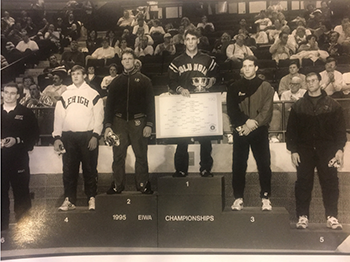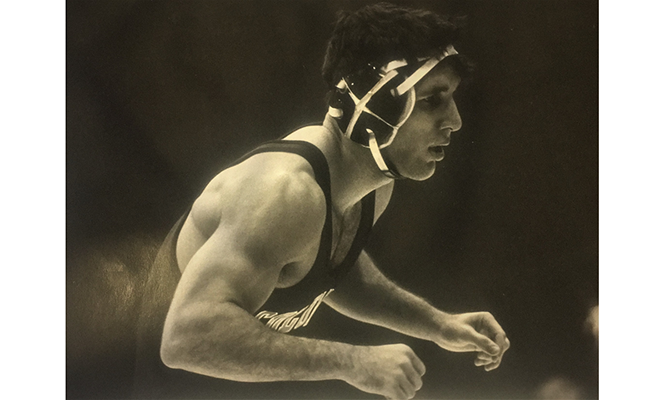“Once you have wrestled everything else in life is easy.”
Dan Gable (wrestling coach, University of Iowa, 1976-1997).
Many aspects of sports help us in our day-to-day regimen as surgeons. A recent article in World Neurosurgery paralleled the neurosurgeon with the high-performance athlete.1 This correlation has been made before, proposing that the lessons learned in high-performance athletics may engender success in a surgical field. Individuals who have competed in elite-level athletics (i.e., collegiate, international or professional level competition) possess many attributes required of a surgeon:
- Discipline;
- Emotional intelligence; and
- The ability to appreciate long-term gains of training.
Although I participated in collegiate sports, I do not consider myself as having been an elite athlete. What I can tell you is that athletics changed my life and I would not be where I am today without it. The lessons I learned in athletics shaped my mindset and permeate my character. I fall back on these lessons regularly. Anyone who knows me knows that I was a wrestler, and even though I have not wrestled competitively in over 20 years, I still identify myself as a wrestler.
Wrestling: Lessons I Learned
Wrestling has taught me many things that have been extremely helpful throughout my career as a neurosurgeon. In wrestling you are out there alone. You win or lose by yourself. There is nobody else to blame for failure.
To be successful at wrestling (or any other high-level athletics), you must analyze your failures and learn from them. In college, every Sunday night, my coach and I watched the matches from the week before and discussed everything that went right or wrong and how to avoid repeating mistakes. Neurosurgery is no different. Taking an analytical approach to every case when I was in training and ever since has allowed me to continuously hone my surgical technique. After surgery, I review each case in my head and think about what I could have done better that would improve the success of similar cases in the future.
 The sport of wrestling is grueling and full of sacrifice. You have to watch what you eat and train every day with discipline and with a goal to be great at it, knowing that greatness in wrestling does not happen overnight. While others are out with friends, you are in the gym. This lifestyle helped me navigate the rigors and personal surrender of neurosurgery residency. While others struggled with the long hours and selflessness required to become a neurosurgeon, I found the hours as well as the physical and mental fatigue easier to deal with than most.
The sport of wrestling is grueling and full of sacrifice. You have to watch what you eat and train every day with discipline and with a goal to be great at it, knowing that greatness in wrestling does not happen overnight. While others are out with friends, you are in the gym. This lifestyle helped me navigate the rigors and personal surrender of neurosurgery residency. While others struggled with the long hours and selflessness required to become a neurosurgeon, I found the hours as well as the physical and mental fatigue easier to deal with than most.
Wrestling Made Me Humble
Beyond the rigor, I learned many lessons from wrestling. I learned to be humble, that I am in-fact not in control of everything and that focusing on what you can control, and not worrying about the rest, will lead to success. As a typical self-involved teenager dealing with an injury that would keep me out of competition for a week, I mentioned that I thought my absence would adversely affect the team. My high school wrestling coach made one of the most poignant comments ever. He looked at me and said plainly, “Always remember you need wrestling way more than it needs you.” I thought about that for a while and over the years have gained insight into this comment. I got so much more from the sport than I gave back. I have learned so many lessons. It got me into college and medical school, and I feel it played huge part in my training and success as a neurosurgeon. Neurosurgery has also given me so much, which I constantly strive to give back to patients and the specialty.
The Easy Life after Wrestling
Dan Gable was mostly correct when he said, “Once you wrestle everything else in life is easy.” It definitely made neurosurgical training easier, but there are plenty of aspects of neurosurgery for which nothing can prepare one. No matter your humility, neurosurgery will always humble you in unexpected ways. Our relationships with patients and their families are truly rewarding and heartbreaking in unique and special ways.
Reference
1. Spiotta, A. M., Buchholz, A. L., Pierce, A. K., Dahlkoetter, J., & Armonda, R. (2018). The Neurosurgeon as a High-Performance Athlete: Parallels and Lessons Learned from Sports Psychology. World Neurosurgery, 120.
[aans_authors]








